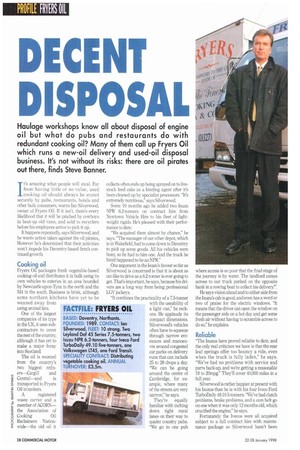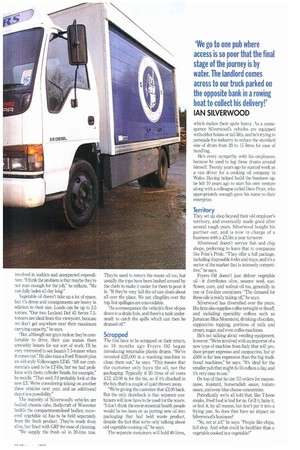PROFILE FRYERS OIL
Page 30

Page 31

If you've noticed an error in this article please click here to report it so we can fix it.
DECENT DISPOSA
Haulage workshops know all about disposal of engine oil but what do pubs and restaurants do with redundant cooking oil? Many of them call up Fryers Oil which runs a new-oil delivery and used-oil disposal business. It's not without its risks: there are oil pirates out there, finds Steve Banner.
It's amazing what people will steal. Far from having little or no value, used cooking oil should always be stored securely by pubs, restaurants, hotels and other bulk consumers, warns Ian Silverwood, owner of Fryers Oil. If it isn't, there's every likelihood that it will be pinched by cowboys in beat-up old vans, and sold to recyclers before his employees arrive to pick it up.
It happens repeatedly, says Silverwood, and he wants action taken against the oil pirates, However he's determined that their activities won't impede his Daventry-based firm's continued growth.
Cooking oil
Fryers Oil packages fresh vegetable-based cooking oil and distributes it in bulk using its own vehicles to eateries in an area bounded by Newcastle-upon-Tyne in the north and the M4 in the south. Business is brisk, although some northern kitchens have yet to be weaned away from using animal fats.
One of the largest companies of its type in the UK, it uses subcontractors to cover the rest of the country, although it has yet to make a major foray into Scotland.
The oil is sourced from the country's two biggest refin
ers—Cargill and Central—and is transported to Fryers Oil in tankers.
A registered waste carrier and a member of ACORN— the Association of
Cooking Oil Reclaimers Nationwide—the old oil it
collects often ends up being sprayed on to livestock feed cake as a binding agent after it's been cleaned up by specialist processors, "It's extremely nutritious," says Silverwood.
Some 10 months ago he added two Isuzu NPR 6.2-tonners on contract hire from Newtown Vehicle Hire to his fleet of lightweight rigids. He's pleased with their performance to date.
"We acquired them almost by chance," he says. "The manager of our other depot, which is in Wakefield, had to come down to Daventry to pick up some goods. All his vehicles were busy, so he had to hire one. And the truck he hired happened to be an NPR."
One argument in the Isuzu's favour so far as Silverwood is concerned is that it is about as car-like to drive as a 6.2-tonner is ever going to get. That's important, he says, because his drivers are a long way from being professional LGV jockeys.
"It combines the practicality of a 7.5-tonner with the useability of a light van," he reckons. He applauds its compact dimensions. Silverwood's vehicles often have to squeeze through narrow entrances and manoeuvre around congested car parks on delivery runs that can include 25 to 28 drops a day. "We can be going around the centre of Cambridge, for example, where many of the streets are very narrow," he says.
They're equally familiar with inching down tight rural lanes on their way to quaint country pubs. "We go to one pub where access is so poor that the final stage of the journey is by water. The landlord comes across to our truck parked on the opposite bank in a rowing boat to collect his delivery!".
He says vision ahead and to either side from the Isuzu's cab is good, and even has a word or two of praise for the electric windows. "It means that the driver can open the window on the passenger side on a hot day and get some fresh air without having to scramble across to do so," he explains.
Reliable
"The Isuzus have proved reliable to date, and the only real criticism we have is that the rear leaf springs offer too bouncy a ride, even when the truck is fully laden," he says. "We've had no problems with service and parts back-up, and we're getting a reasonable 19 to 20mpg." They'll cover 40,000 miles in a full year.
Silverwood is rather happier at present with his Isuzus than he is with his four Iveco Ford TurboDaily 49.10 5-tonners. "We've had clutch problems, brake problems, and a cam belt go on one when it was only 12 months old, which crucified the engine," he says.
Fortunately the Ivecos were all acquired subject to a full contract hire with maintenance package so Silverwood hasn't been
involved in sudden and unexpected expenditure. "I think the problem is that maybe they're not man enough for the job," he reflects. "We run fully laden all day long" Vegetable oil doesn't take up a lot of space, but its dense and consignments are heavy in relation to their size. Loads can be up to 2.5 tonnes. "Our two Leyland Daf 45 Series 7.5tanners are ideal from this viewpoint, because we don't get anywhere near their maximum carrying capacity," he says.
"But, although our guys reckon they're comfortable to drive, their size makes them unwieldy beasts for our sort of work. I'll be very interested to see Isuzu's 7.5-tonner when it comes out." He also runs a Ford Transit plus an old-style Volkswagen LT45. "All our commercials used to be LT45s, but we had problems with them; cylinder heads, for example," he recalls. "That said, I'd probably look at the new LT We're considering taking on another three vehicles next year, and an additional depot is a possibility" The majority of Silverwood's vehicles are bodied chassis cabs. Bodycraft of Worcester builds the compartmentalised bodies; recovered vegetable oil has to be held separately from the fresh product. They're made from alloy, but lined with GRP for ease of cleaning.
"We supply the fresh oil in 20-litre tins. They're used to return the waste oil too, but usually the tops have been bashed around by the chefs to make it easier for them to pour it in, "If they're very full the oil can slosh about all over the place. We put clingfilm over the top, but spillages are unavoidable.
"As a consequence the vehicle's floor slopes down to a drain hole, and there's a tank underneath to catch the spills which can then be drained off."
Scrapped
The tins have to be scrapped on their return, so 18 months ago Fryers Oil began introducing returnable plastic drums. "We've invested £25,000 in a washing machine to clean them out," he says. "This means that the customer only buys the oil, not the packaging. Typically if 20 litres of oil costs £12, £2.00 is for the tin, so if it's chucked in the bin, that's a couple of quid thrown away.
"We're giving the customer that £2.00 back. But the only drawback is that separate containers will now have to be used for the waste. "I don't think the environmental health people would be too keen on us putting new oil into packaging that had held waste product, despite the fact that we're only talking about old vegetable cooking oil," he says.
The separate containers will hold 40 litres, which makes them quite heavy. As a consequence Silverwood's vehicles are equipped with either hoists or tail-lifts, and he's trying to persuade his industry to reduce the standard size of drum from 20 to 15 litres for ease of handling.
He's every sympathy with his employees, because he used to lug those drums around himself. Twenty years ago he started work as a van driver for a cooking oil company in Wales. Having helped build the business up, he left 10 years ago to start his own venture along with a colleague called Dave Fryer, who appropriately enough gave his name to their enterprise.
Territory They set up shop beyond their old employer's territory, and eventually made good after several tough years. Silverwood bought his partner out, and is now in charge of a business with a £3.5m a year turnover.
Silverwood doesn't service fish and chip shops, preferring to leave that to companies like Friar's Pride. "They offer a full package, including disposable forks and trays, and it's a sector of the market that is intensely competitive," he says.
Fryers Oil doesn't just deliver vegetable oil—it distributes olive, sesame seed, sunflower, corn, and walnut oil too, generally in one or five-litre containers. "The demand for these oils is really taking off," he says.
Silvenvood has diversified over the years. His firm also supplies coffee (straight or decaff, and including speciality coffees such as Jamaican Blue Mountain), drinking chocolate, cappuccino topping, portions of milk and cream, sugar, and even coffee machines.
He's not talking about vending equipment, however. "We're involved with an importer of a new type of machine from Italy that will produce proper expresso and cappuccino, but at £600 is far less expensive than the big traditional machines," he says. "It's ideal for the smaller pub that might do 50 coffees a day, and it's very easy to use."
On top of that he can fill orders for mayonnaise, mustard, horseradish sauce, tomato sauce, and even blue cheese concentrate.
Periodically we're all told that, like T-bone steaks, fried food is bad for us. Grill it, bake it, or boil it, by all means; but don't put it into a frying pan. So does that have an impact on Silverwood's business?
"No, not at all," he says. "People like chips, full stop. And what could be healthier than a vegetable cooked in a vegetable?"
FACTFILE: F RYERS OIL BASED: Daventry, Northants. FOUNDED: 1989. CONTACT: Ian Silverwood. FLEET: 10 strong. Two Leyland Daf 45 Series 7.5-tanners, two Isuzu NPR 6.2-tanners, four Iveco Ford TurboDaily 49.10 five-tanners, one Volkswagen 1T45, one Ford Transit. SPECIALITY CONTRACT: Distributing vegetable cooking oil. ANNUAL TURNOVER: £.3.5m.






































































































